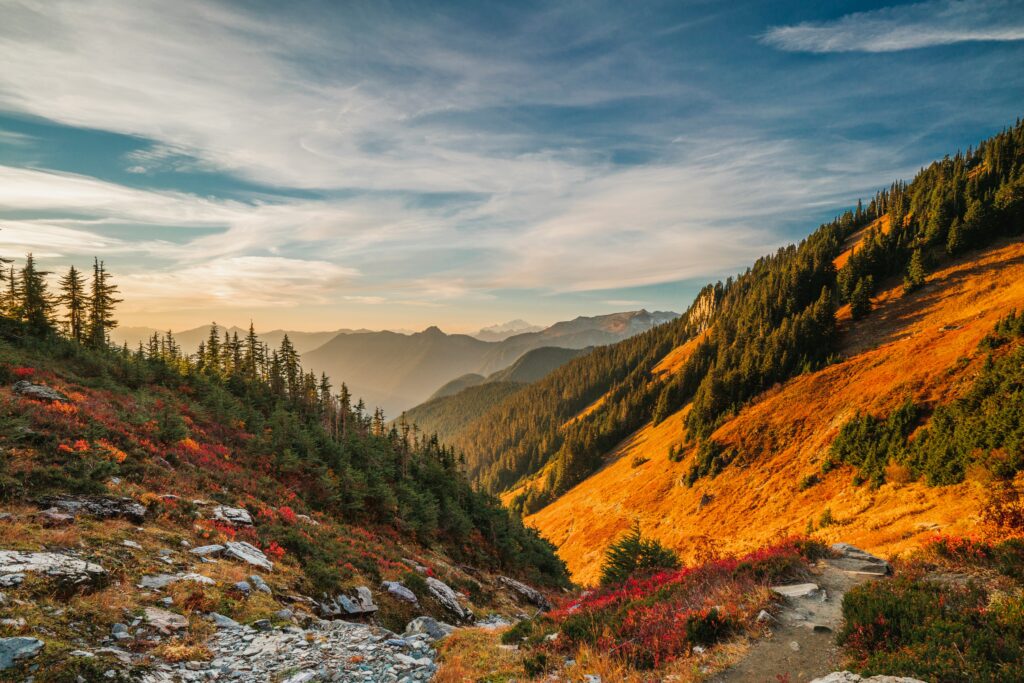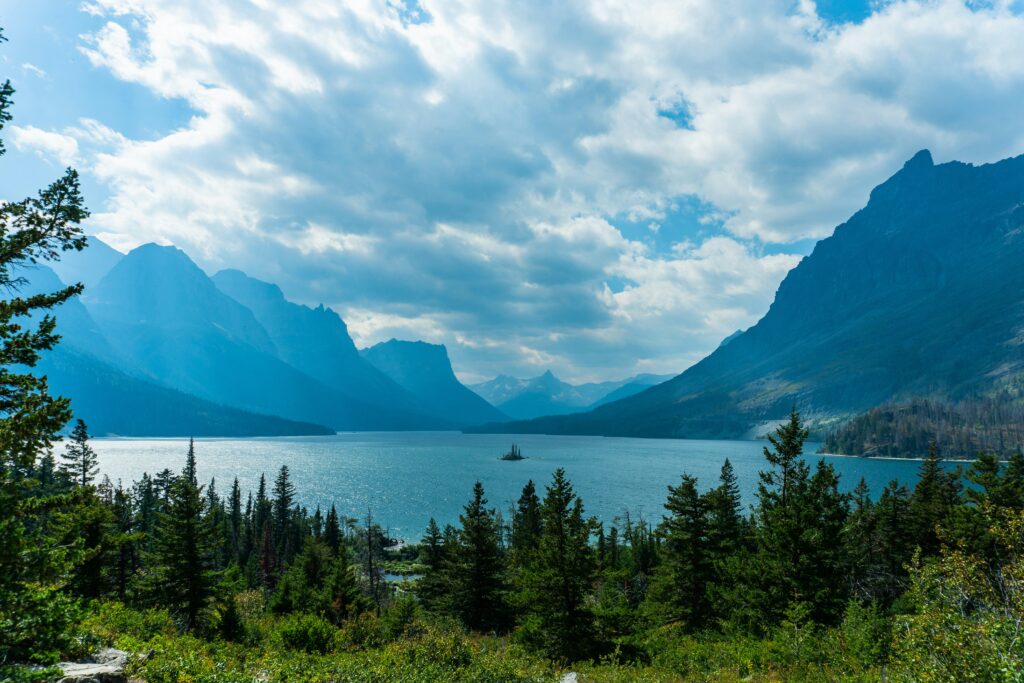
We have over 400 ANHE Members in Alaska, Idaho, Montana, North Dakota, Oregon, South Dakota, Washington, and Wyoming! Let’s join together to assure that all individuals in the Pacific Northwest have access to clean air, water, and soil. We host events, share information about what’s going on, and create opportunities for nurses to talk to their legislators and each other about all things environmental health.
What We’re Working On

Tell Your Senator: Stop the Sale of Public Lands!
According to media reports, the current administration is considering reducing protections for at least six national monuments—including ones in the Grand Canyon and Utah’s desert country. Help protect these landscapes by donating today!

Tell Governor Ferguson (WA): Lead on Climate Safety
It is more important than ever for states to act on climate change. States—and their governors—can be powerful leaders in building a clean energy economy. That’s why we’re asking Governor Ferguson to build on the previous administration’s legacy and step up to continue slashing climate pollution, protect children’s health, and ensure environmental justice. Our future depends on it.

Tell Governor Gianforte (MT): Lead on Climate Safety
It is more important than ever for states to act on climate change. States—and their governors—can be powerful leaders in building a clean energy economy. That’s why we’re keeping the drumbeat up on climate for Governor Gianforte. Climate change is impacting Montana communities now, and we must work to slash climate pollution, protect children’s health, and ensure environmental justice. Our future depends on it.

Climate + Health Peer Learning Circle, 2025
Raise your health voice and make an impact! Join a dynamic community of health leaders dedicated to driving climate action and creating lasting change.
The Climate Advocacy Lab’s Climate + Health Peer Learning Circle is a free training program designed for experienced leaders at the intersection of climate and health. This regional initiative combines in-person workshops and virtual sessions to foster peer learning and collaboration. Participants will refine their leadership skills, gain strategies for community engagement, and exchange insights with a network of accomplished peers. If you’re ready to amplify your impact and drive systemic change, this program will equip you with the tools and connections to lead transformative climate action.
The health impacts of climate change are undeniable—and the time to act is now. As a health professional, you have the power to protect human health and inspire change.

Meet Your North West Regional Forum Organizer
Frances DeForrest, BSN, RN
Frances is a registered nurse having earned an Associate Degree in Nursing Science from Delaware Technical and Community College starting her nursing career in 1998. After raising two daughters and a grandson, as a solo parent. Frances went on to earn her bachelor’s degree from Drexel University in 2015. During her nursing career, Frances started in a hospital setting then transitioned into a specialty of triage nursing that she applied to university, school and summer camp and telehealth settings. Frances also has experience caring for elder and veteran populations. As well as a birth doula in home and hospital settings. This has given Frances nursing experience with people across the lifespan of many populations.Frances’s environmental education began with her mother, a wandering botanist spending many a day traipsing through the Eastern woodlands. Frances now makes botanical print art that allows her to similarly experience the wonder of the natural areas while collecting leaves and medicinals.Frances spent years walking or riding bikes as year round transportation and was part of a group that made and ran biodiesel for 4 years in Missoula, MT. More recently Frances has developed a Botanical Art and Hemp Education business that is focusing on hemp lime construction as fire resistant housing material. This display also has a covered wagon style mini house that includes biobased hemp construction products such as wood, fabric, and plastic. Frances recently started writing articles for the Montana Cannabis Magazine. She has post bachelors degree continuing education in whole health, nutritional psychiatry and cannabis as medicine that includes looking at the connections between our soil health and gut microbiome. Frances has participated in ANHE events and Capitol Hill calls over the last decade. She looks forward to working with everyone to create a forum that shows environmentally beneficial actions by citizens in our communities as well as actions to take politically as we stand together to ensure our environment stays healthy.
Contact Frances at anheforumpnw@gmail.com
Highlights
Training the Next Generation of Climate Leaders
Brownfield Assessment Grants
Brownfield Assessment Grants provide funding for developing inventories of brownfield sites, prioritizing sites, conducting community involvement activities, conducting planning, conducting site assessments, developing site-specific cleanup plans, and developing reuse plans related to brownfield sites.
The goal of the Brownfield program is to assist in planning the cleanup, development, and reuse of property that may be complicated by the presence or potential presence of a hazardous substance, pollutant, or contaminant. Properties can be redeveloped for housing, industry, or public green spaces.
There are 3 options for assessment grants for FY2026.
- Community-Wide Assessment Grants
- Community-Wide Assessment Grants for States and Tribes
- Assessment Coalition Grants
A critical part of EPA’s Brownfield program is to ensure that residents living in communities historically affected by economic disinvestment, health disparities, and environmental contamination are able to benefit from brownfield redevelopment.
In addition to the assessment grants, there are 3 other funding opportunities under the Brownfield program.
Plaintiffs from landmark Held case file constitutional climate case against Trump, federal agencies
Pacific Northwest Climate Week
Pacific Northwest Climate Week, happened July 16-25, 2025. PNW Climate Week is a community-powered event series that unites individuals and organizations and accelerates the fight against climate change. This empowering, week-long gathering brings together climate innovators, thought leaders, and enthusiasts from vibrant cities like Seattle, Vancouver, and Portland. Learn more here.
Logging has a lengthy history in the Pacific Northwest and local industry leaders say it’s taken decades to find a balance between economy and environment
(Washington) “The US Forest Service has been tasked by President Trump to create a plan that will increase timber production in federal forests, and Pacific Northwest industry leaders are waiting to see how that plan will be implemented in a region rich in logging history. Many leaders are worried that this new order will disrupt the decades of work put into policies locally…
Logging has historically been a staple industry in the northwest that has simultaneously been an ongoing conversation between the need to harvest for building and economy, and also protecting the environment within these forests.”
Source: King 5 News, Read full article here.
A Flathead Lake watchdog group and CSKT are suing the state of Montana for approving a new sewage treatment plant that they say could add nutrient pollution to Flathead Lake
(Montana) “A complaint alleges the DEQ issued a discharge permit for a new wastewater facility without properly analyzing how the nutrients could degrade Flathead Lake.”
Source: KPAX News, Read full article here.
CSKT issues a fish consumption warning for three rivers
(Montana) “The Confederated Salish and Kootenai Tribes have issued an indefinite fishing warning for tribal anglers about eating fish on or near the reservation in certain rivers.
The Confederated Salish and Kootenai Tribes are advising all tribal members to avoid consuming all species and sizes of fish harvested from the lower Clark Fork River from the Bitterroot River near Missoula to the Flathead River near Paradise. Recent testing has confirmed the presence of polychlorinated biphenyls (PCBs), dioxins, and furans in fish at levels that are unsafe for consumption by tribal peoples, according to a press release sent Tuesday.
“This is a precaution rooted in science and our responsibility to protect tribal health and well-being. We urge our people to stay informed and make safe choices,” said Tom McDonald, CSKT Council Vice-Chairman.”
Source: Daily Montanan, Read full article here.
USDA announces plan to rescind Roadless Rule, opening 59 million forest acres to development
(Alaska) “The Department of Agriculture announced its intent to rescind the Roadless Rule, which provides automatic environmental protections to federally owned lands without roads throughout the United States.
Agriculture Secretary Brooke L. Rollins made the announcement at a meeting of the Western Governors’ Association in New Mexico on Monday. Rescinding the Roadless Rule will open nearly 59 million acres of national forest to road construction, development and timber harvesting, according to a USDA press release.
Road construction will help the U.S. Forest Service reach and manage potential wildfire hazards, Rollins said in the statement.
“This move opens a new era of consistency and sustainability for our nation’s forests,” Rollins said. “It is abundantly clear that properly managing our forests preserves them from devastating fires and allows future generations of Americans to enjoy and reap the benefits of this great land.””
Source: Tribal Business News, Read full article here.
The Hamilton City Council has voted to enter a contingency agreement and passed a resolution to join a nationwide civil action settlement concerning “forever chemicals” in drinking water at their May 6 meeting
The settlement follows a number of lawsuits filed against chemical companies DuPont Inc. and 3M regarding polyfluoroalkyl substances (PFAS) found in drinking water. While the settlement amount or possibility of Hamilton being awarded funds was not ensured, the legal agreement would assist with filing appropriate claims and allow the city to conduct additional PFAS testing. Learn more here.
Attention Spokane, Washington Community: The Community Climate Action Fund is currently accepting grant applications for Environmental Justice projects!
In January, 2025, the Climate Institute was awarded a $19.9 million grant from the Environmental Protection Agency’s Environmental and Climate Justice Community Change Grants Program. Of this funding, $2.6 million has been allocated to the creation of this Community Climate Action Fund (Climate Fund) with the goal of allowing Spokane community-based organizations (CBOs) to determine the best use of this environmental justice funding. This opportunity comes at a crucial time as Spokane and the Inland Northwest face the growing impacts of climate change. Learn more here.
Gianforte signs MEPA bills into law
Montana Gov. Greg Gianforte last week signed into law a handful of bills revising the Montana Environmental Policy Act, the state’s 54-year-old “look-before-you-leap” law that directs state agencies to study and disclose large projects’ environmental impacts before issuing permits.
The Held v. Montana ruling issued by the state Supreme Court in December played a prominent role in lawmakers’ handling of MEPA during the 69th legislative session that adjourned last week. In that order, Montana’s highest court faulted the state for failing to consider the climate impacts of fossil fuel projects such as coal mines and power plants in its permitting process. Read more here.
Source: Eggert, A. (2025). Gianforte signs MEPA bills into law. Montana Free Press. https://montanafreepress.org/2025/05/05/gianforte-signs-mepa-bills-into-law/
$5M Awarded to Pacific Northwest Natural Climate Solutions Projects
The Paul G. Allen Family Foundation accelerates climate change mitigation efforts with $5 million in grants to six place-based, natural climate solutions (NCS) projects across the Pacific Northwest (PNW).
With this new funding, the foundation is tapping into the PNW’s diverse strength and heritage in conservation innovation, as well as the regional leadership, ecological stewardship, and historical knowledge of Indigenous peoples and local communities in the region. Projects will be conducted in Washington, Oregon, Alaska, British Columbia, and Idaho, with the majority led by Native American and First Nations partners. Read more here.
Source: pgafamilyfoundation. (2025). $5M awarded to pacific northwest natural climate solutions projects. Paul G. Allen Family Foundation. https://www.pgafamilyfoundation.org/press-room/2025/natural-climate-solutions-grantees-2025#:~:text=Seattle%2C%20WA%20%E2%80%94%20Feb%2027%202025,21%25%20of%20net%20annual%20emissions
North Dakota Priority Climate Action Plan Created
The Department of Environmental Quality collaborated with North Dakota residents, community leaders, and key economic sectors to produce the first state plan aimed at environmental sustainability and reducing greenhouse gas emissions. The initial stage of a multi-year planning effort, the North Dakota Priority Climate Action Plan features five implementation-ready strategies from the state’s agriculture, energy, and natural lands sectors to fuel local economies, strengthen energy independence and reduce pollution throughout North Dakota. Read more here.
